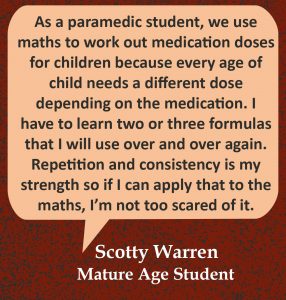Studying Maths
Anita Frederiks and Rowena McGregor

Introduction
This chapter provides strategies to empower you to study maths in whatever form you encounter it at university. It begins by describing how maths and mathematical thinking is vital to many of the professions. It then discusses maths anxiety and presents six strategies for overcoming this common problem. Next, the chapter addresses how to approach studying maths in general, and how to approach a single module of work in maths, followed by a discussion of problem-solving and hints for success. It concludes with some tips for how to approach maths assessments. Altogether, the chapter will put you on the path to a successful encounter with maths at university.
WHO NEEDS MATHS?

Many professions are highly dependent on maths. Student scientists, engineers, and accountants may work with maths in every subject. Students in other disciplines may encounter one or more maths courses or assessments. Nursing and paramedics students will encounter medication calculations for example. Similarly, many students who wish to work in people-helping professions will need to be able to interpret statistics to ensure their approaches to problems and interventions are sound. This will include students of psychology, human services, and education. No matter your discipline, this chapter will help you approach the maths content in your courses with successful strategies and a positive attitude.
MATHS ANXIETY AND ITS IMPACT ON STUDYING MATHS
When studying maths, students often become anxious and start to overanalyse the maths content. Overanalysing can further elevate their anxiety and create difficulty in understanding the underpinning maths concepts.
The Australian Council of Educational Research (ACER) defines maths anxiety as “feelings of unease and worry experienced when thinking about mathematics or completing mathematical tasks” (Buckley, Reid, Goos, Lipp, & Thomson, 2016, p. 158). Maths anxiety causes people to have significant self-doubt in their ability to do maths, causing them great distress.

When a person has maths anxiety, their brain continually thinks about the anxiety rather than the actual maths problem. The brain allocates the working memory and other resources that it would normally use with computations of the maths problem to the anxiety itself, making it very difficult to learn or retain the relevant skills or information (Marshall, Staddon, Wilson, & Mann, 2017). Maths anxiety is highly prevalent. Sadly, between 25% to 80% of the college population in the United States of America has some form of maths anxiety and the percentage is likely to be similar in Australia, given the similarities in culture (Koch, 2018).
Symptoms and causes of maths anxiety
Maths anxiety can easily be identified. The symptoms of maths anxiety range from simple low confidence problems to more complex physical symptoms. If you experience the following, you may have maths anxiety:
- low confidence and negative thoughts such as “I am no good at maths”, “I won’t be able to do this”, “I am never going to understand this maths concept” (Department of Education, 2020).
- physical symptoms ranging from increased heart rate, increased breathing to a panic attack when thinking about or doing maths (Department of Education, 2020).
The symptoms of maths anxiety are triggered when doing maths or from the thought (anticipation) of doing maths. The level of anxiety will vary from person to person (Department of Education, 2020). While maths anxiety is common, it can be managed or resolved allowing you to succeed in your maths learning journey.
Strategies to reduce maths anxiety
You will be able to recognise when you are starting to feel stressed or anxious and having difficulty trying to complete maths problems. This could include avoiding maths classes, revision and assessment. At this point, you could develop some methods to help you to relax and unwind. Some different strategies you may be able to use distraction techniques including reflecting on how you feel; leaving the room to do another activity for short periods of time; mindful breathing techniques (such as breathing in for a count of 5, and breathing out for a count of 7); or any other techniques you may already use for reducing anxiety.
It is also helpful to remind yourself of what you can do by returning to a problem that you can do before attempting the problem which caused the stress. More information about mental health resources (including sections on stress and anxiety) can be found in the chapter Successful Connections.
Maths anxiety can be managed in a positive way using six strategies. The strategies will need to be employed over time to see the results. Addressing your maths anxiety using these six strategies also allows you to study maths effectively.
Six strategies you can use to help reduce maths anxiety
Strategy 1: Create a safe, calm and comfortable study environment. When you are in a comfortable environment, you have more scope to use your working memory to understand the maths concepts as it is not occupied with the distractions of a busy or stressful environment.
Strategy 2: Check your self-talk and beliefs about your ability to do maths. Self-efficacy is the belief that we are capable of successfully performing a task, for example studying maths. Self-efficacy influences your confidence and likelihood of success. Changing any negative thoughts about maths to positive thoughts will greatly increase the likelihood of succeeding in maths. For example, if you catch yourself thinking, “I can’t do this”, try to tell yourself “I can do this!” Similarly, if you tell yourself “I am no good at maths”, remind yourself that, “I can improve at maths”.
Strategy 3: Keep up with your coursework. Maths courses tend to build on concepts over the course, so skipping classes or homework makes it very difficult to learn work presented later in the term. Completing your work in order each week will also give your brain the time it needs to make mental maps of the concepts, and store these in your working memory. Memorising or “cramming” does not help you with learning maths effectively, and thus should be avoided.
Strategy 4: Show all the processes (the ‘full working’) as you practice maths problems. When practising the maths concepts with the full working, you are storing these processes in your working memory. This allows you to make a mental map of the concept and increases your understanding of that concept. It also allows your brain to form the connection of where and how to apply the maths concept. This allows for easier recall and application of the process. Your setting out will become automatic, for example, aligning your equal signs throughout the problem using the correct symbols and notations, and adding text to explain what you are doing (See Figure 5.3). When these become automatic, you won’t have to worry about them in your assessment. Practising with all the process will also help you to identify what you don’t understand and know when to seek help.
Strategy 5: Seek help as soon as the need arises. Asking for help can be difficult. However, to succeed with maths (and overcome maths anxiety), it is important that you approach your teaching team (or other maths support services) to seek assistance. Your teaching or university maths support team has extensive experience and can help you by breaking down the concepts into smaller and simpler processes that are easier to understand. You may also have access to peer-facilitated study groups and these can be an excellent source of practical help and encouragement.
Strategy 6: Use timed practice. Timed practice models what you will need to do during a timed assessment item, such as an exam. You will collect or create some problems, then set a timer and work through as many of the problems as you can in this time. Practising in a similar, but less pressured environment than an exam can help you to overcome your anxiety of doing maths in timed situations. Using timed practice can build your confidence in completing different maths questions and build your speed in applying the concepts.

The use of the six strategies will increase your confidence and help you to form good mental maps within your working memory. Over time, this will reduce your maths anxiety and break down the associated barriers that make studying maths more difficult than it needs to be.
FOCUS ON UNDERSTANDING THE PROCESS

The strategies presented to help reduce maths anxiety are good practice for any student learning maths. To be successful in maths, you will also need to understand the process used for solving maths problems. That means you need to understand why the process works. Understanding the process will help you to remember how to do the maths. To develop understanding, revise and rewrite calculations that you are shown in lectures or tutorials. Things always look easier when someone else is showing you how to do it, compared to when you try at home on your own! Rewriting the steps will make it easier to complete different questions and you will have good notes for revision.
Understanding the process also gives you some flexibility when approaching maths problems. Sometimes there may be more than one method for coming to the right answer. If you understand the processes, you will be able to identify the most effective method to complete the question and then apply it. If a question doesn’t specify a particular method to use to solve the problem, you can also choose a method that suits you best.
APPROACHES FOR STUDYING EACH MODULE
Now that you have some strategies for combatting maths anxiety, and studying maths effectively, you can begin your maths journey at university with a positive mindset. We will now discuss how to study maths, module by module. But, what are modules? Some degrees will have entire courses that focus on maths, such as Fundamental Statistics, Foundation Mathematics, or Algebra and Calculus. Within these courses, the maths concepts are broken up into smaller segments for you to study, often known as modules. Modules allow you to look at one new concept at a time and gradually build your knowledge, experience and confidence. When beginning a new module, try these approaches to make your maths study more manageable:
- Work out what the module is about and what you are expected to learn. Before you start any exercises, scan the entire module and check the learning objectives for a summary of what to expect.
- Start at the beginning of the module, reading through the text and examples. When you come to an activity, attempt the questions yourself. This will help you to learn the formulae and when and how to apply them, thus developing your problem-solving techniques. It will also give you an idea of what you know and where you need to focus.
- Do not skip over any of the study materials. Maths is an iterative process, you will need to develop strong foundations and repeatedly revisit and build upon these foundations.
- Summarise the module as you work through it. List any new formulae and problem-solving techniques and take note of anything that you do not understand so you can seek assistance.
- Talk about your maths. It is amazing how problems can be clarified by talking with somebody. You can do this with friends, work colleagues, at tutorials (in person or online) or through course discussion forums or groups.
- Ensure that you have a complete understanding of the topic that you are studying. If you cannot understand a topic, look for alternative resources that may explain it in a different way, contact the teaching team, or university maths support team.
- Contact your teaching team or university maths support team for help if you get stuck. Do this as soon as you have a problem so that you can move on with your studies, and not get behind. Check to see if your university has any maths support services, for example, learning advisors, tutors or peer mentoring programs. Knowing in advance what help is available and how to access it can save precious time and help prevent a small issue from becoming something worse over the course of your studies.
STRATEGIES FOR PROBLEM SOLVING
In many ways, maths is like solving a puzzle, where a question is posed, and you must find the answer. At the heart of this process is what we call problem-solving skills. Problem-solving questions are typically the worded questions you find in the application sections of your materials, or in your assignments. Problem-solving skills are something that can be practised and developed to make you more confident and capable with your maths. Most people find problem-solving difficult, and as such, it is an area they need to spend time developing. Here are some tips to help develop your skills:
- Read the question or problem carefully and identify what you are expected to find.
- Determine whether any of the information is not needed for solving the problem.
- Express the relevant information in mathematical terms, defining any variables that you are given and noting any special conditions.
- Break down the problem into smaller parts.
- Estimate the answer to the part of the problem that you cannot solve yet and proceed from there.
- Decide which of the skills or techniques you have learnt in the course could be applied to solve the problem.
- Apply the technique that you think will solve this problem. Try a different technique if the first did not work.
- Check that your answer makes sense to the problem.
Even if things haven’t gone quite right, there are problem-solving strategies you can use to help put yourself back on the right path. You can:
- Check that you copied down everything correctly.
- Scan for errors in your calculations.
- Look back at your working and answers to similar questions.
- Start with a fresh page where you cannot see what you have done previously.
- Read the question aloud and slowly.
- Leave the problem for tomorrow (but don’t leave it too long).
- Ask for help from your teaching team, university maths support team, study group, or whatever other maths support might be available to you.
MAKING THE MOST OF HELP
Sometimes students need assistance with maths. As discussed, getting help is both a successful strategy for managing maths anxiety and a problem-solving strategy. Here are some suggestions to maximise the benefits of the help you have available:

- Be specific as to what you don’t understand — you do not want the tutor to cover areas where you do not need help. Being specific about what you need will likely save you some time.
- Attempt to solve the problem(s) yourself first and have your working available so that the tutor can discuss it with you. This will develop your problem-solving skills because you will have thought through the problem. It will also show where your understanding is lacking and where you became stuck.
- Attempt similar problems from the study materials or other textbooks/websites that have answers provided, so that you can discuss your problems with the tutor rather than requiring tuition in the basic concepts. This can help tailor the support to your specific needs.
- Be organised and specific. Make a written list of problems that need clarifying, including page numbers in the text, along with your working.
TIPS FOR MATHS ASSESSMENT
After you have studied the modules, you will need to complete some assessment. This section provides hints and tips for your assignments and exams.
Maths Assignments

When studying maths, it is essential to develop regular study patterns. Often your tutorial questions will help you to develop the skills needed in your assignments, so do not leave your maths study until just before an assignment is due.
When undertaking a maths assignment, you must express yourself clearly both in English and mathematics. Many students think that doing maths just involves ‘doing the sums.’ However, ‘doing the sums’ is only one part of doing and being involved in maths. In fact, it doesn’t matter how good you are at doing these sums if you cannot communicate your answers or solutions with others. Remember – in your career, you must be able to convince your colleagues or clients that your answer is the appropriate one. Therefore, communicating is just as important in maths as it is in all other subject areas.
Finally, you need to allow adequate time to present your assignment. Just like your other assignments, you need to complete a rough draft and then prepare a final ‘good’ copy. Your markers are looking for assignments that are neat, tidy, with the maths formatted correctly, and with logical, well documented communication (mathematical and English). This could be as simple as following the guides for best practice for maths notation, such as aligning equal signs, centring equations on the page, defining any variables you have used including their units. Your textbooks and study modules are a good guide to how your lecturers are expecting you to format your assignments.
Maths Exams
The best preparation for exams is to work consistently through the semester (or other study period) and keep up to date with the recommended study schedules provided to you in your courses. This includes working through suggested questions and tutorial questions. Practising maths regularly will develop your skills, confidence, and fluency. Practising your setting out will help you to automatically set your work out neatly in the exam.
In the weeks and days prior to the exam, you might like to use these preparation techniques for maths exams:
- Review the information about spaced practice in the chapter Preparing for Exams to maximise your exam preparation.
- As you have been practising your maths throughout the course, you won’t need to cram the night before the exam. See additional information on cramming in the chapter Preparing for Exams.
- Review your notes (and worked examples) and make a concise list of key concepts and formulae. Make sure you know these formulae and more importantly, how to use them.
- Work through your tutorial problems again (without looking at the solutions). Don’t just read over them. Working through problems will help you to remember how to do them.
- Work through any practice or past exams which have been provided to you. You can also make your own practice exam by finding problems from your course materials. See the Practice Testing section in the chapter Preparing for Exams for more information.
- When working through practice exams, give yourself a time limit. Don’t use your notes or books. Treat it like the real exam.
- For those who suffer maths anxiety—practice any breathing or other techniques that help you to reduce or manage the anxiety.
- Finally, try to get a good night’s sleep before the exam so you are well rested and can concentrate when you take the exam.
Further details about preparing for a maths exam can be found in the chapter Types of Exams.
During your exams, remember to set out and communicate your maths in a way that the marker can follow. Normally the marker is not looking for perfection, but that you have used the correct methods (processes). Once again, communicating what you are doing is just as important as completing the actual calculations.
If you experience maths anxiety, be aware that it may be heightened during timed exams so you will need to remember your strategies for managing it.
CONCLUSION
Maths is an integral part of university study, regardless of which discipline you are studying. This chapter identified the value of studying maths and provided strategies to help students manage maths anxiety. It also presented methods for approaching studying maths in general, how to study single modules, hints for success in problem solving and concluded with tips for how to approach maths assessments. Equipped with these tips and strategies, you are ready to learn and work successfully with maths in your university studies.
Key points
- Maths is an important part of the learning journey.
- The study of maths trains your brain to think logically, accurately, and carefully.
- Maths anxiety is something everyone may experience at different stages in their university studies. The six strategies to help you manage it are: Creating a safe, calm and comfortable environment in which to study, developing positive self-efficacy for maths, practising maths (including all working), seeking help when required, timed practice and understanding the process.
- When seeking help, show your tutor your attempt to solve the problem(s) (with your working) so that they can discuss it with you. This will give you the most tailored support.
- Develop your problem-solving skills to help with applying the concepts in different situations, including assessments.
- Present your maths logically with full working and communication in your assignments.
References
Buckley, S., Reid, K., Goos, M., Lipp, O., & Thomson, S. (2016). Understanding and addressing mathematics anxiety using perspectives from education, psychology and neuroscience. Australian Journal of Education, 60(2), 157-170. https://doi.org/10.1177/0004944116653000
Department of Education. (2020). Mathematics anxiety. State Government of Victoria. https://www.education.vic.gov.au/school/teachers/teachingresources/discipline/maths/Pages/research_overcomingmathsanxiety.aspx
Koch, I. (2018). Mathematics anxiety: Students, pre- and in-service teachers. Australian Mathematical Sciences Institute. https://amsi.org.au/?publications=maths-anxiety-students-pre-and-in-service-teachers
Marshall, E., Staddon, R., Wilson, D., & Mann, V. (2017). Addressing mathematics anxiety and engaging students with mathematics within the curriculum. MSOR Connections, 15(3), 28-35. doi:https://doi.org/10.21100/msor.v15i3.555
ACKNOWLEDGMENTS
We would like to acknowledge Akshay Sahay who contributed to the previous version of this chapter.

